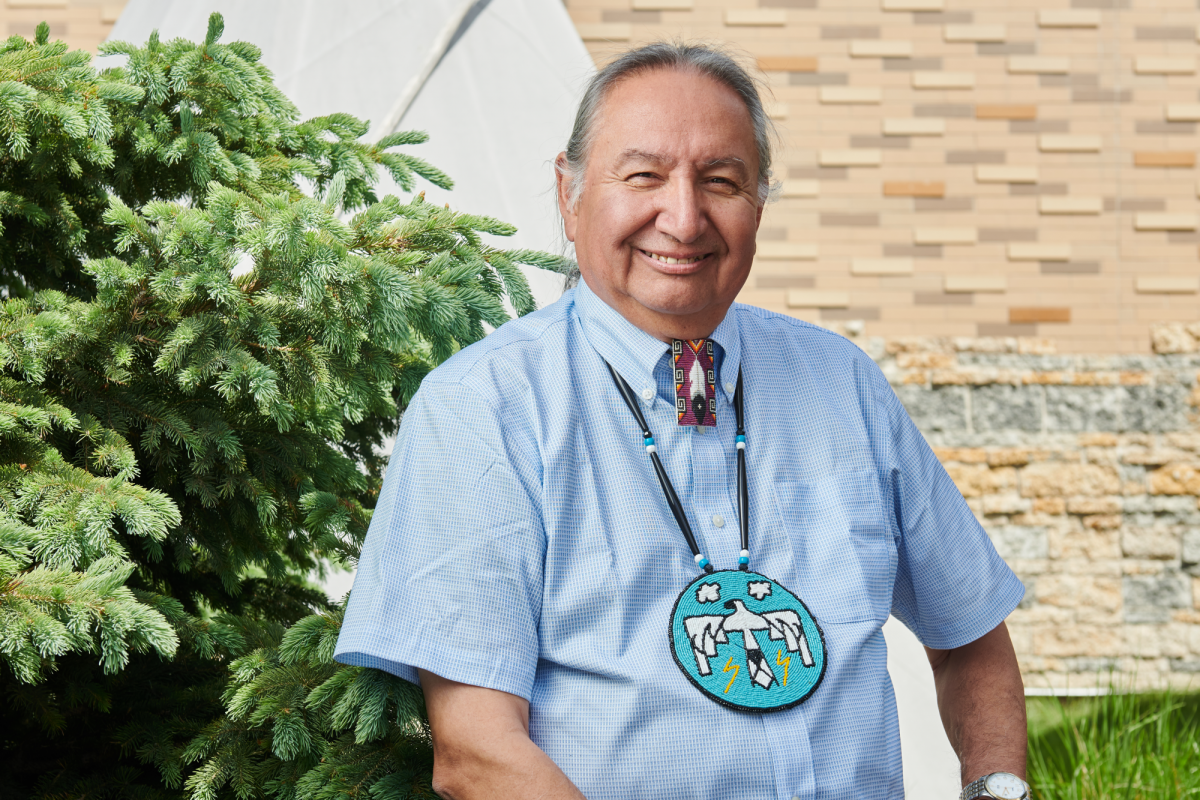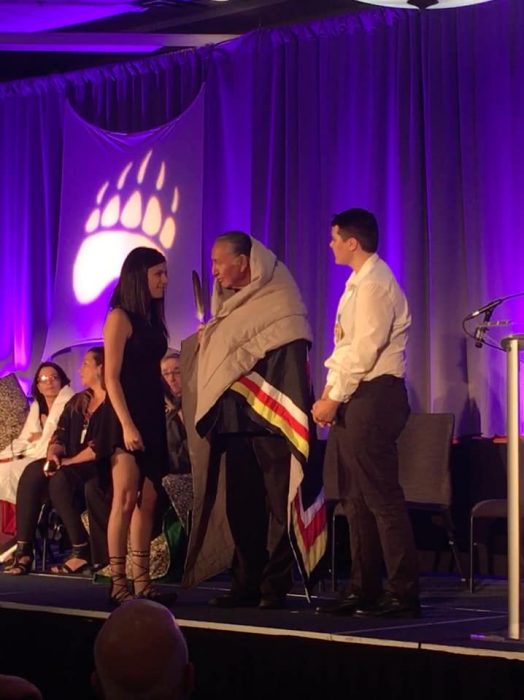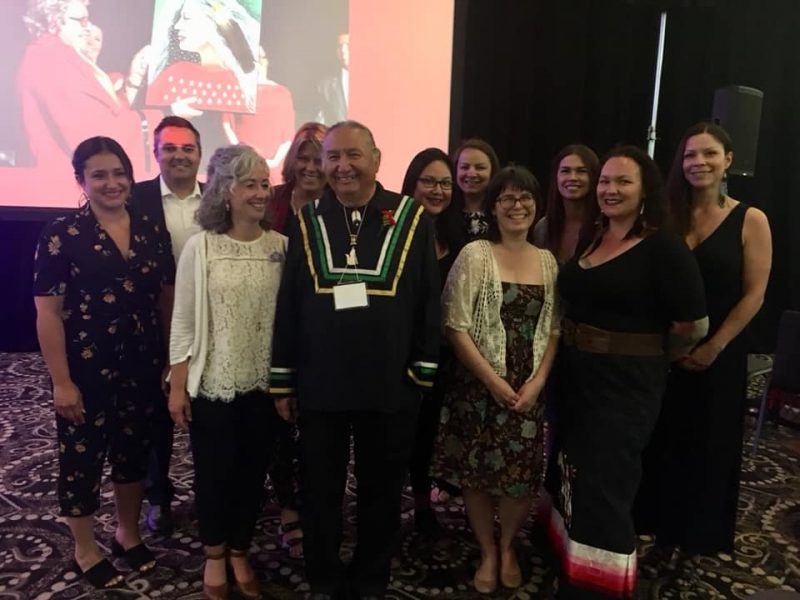
Cultural coordinator and student advisor Carl Stone. // Photo by David Lipnowski.
Cultural leader is honoured at Keeping the Fires Burning ceremony
Carl Stone is recognized for his cultural contributions at 18th annual event.
More than 900 people came together on June 13 to honour and recognize Manitoba’s most influential Grandmothers and Grandfathers at the 18th Annual Keeping the Fires Burning gathering hosted by Ka Ni Kanichihk and sākihiwēwin Foundation. So far, 129 First Nations, Métis and Inuit Grandmothers, Grandfathers and Knowledge Keepers have been honoured at the event. This year, they celebrated eight more, including University of Manitoba student advisor and cultural coordinator Carl Stone.
The goal is to recognize “all of whom have made a significant contribution to the advancement of Aboriginal Peoples, and, indeed, the safeguarding, nurturing and transmission of Traditional Knowledge and Practice.”
There is no doubt that he is a perfect contender for the recognition, as Stone’s contributions range from reintroducing the drum teachings to his home community in his younger years to making safe spaces for Indigenous students to access culture in a learning environment presently.
Whether it’s opening convocation with an honour song, emceeing the 30th Annual Traditional Graduation Pow Wow, hosting Fireside Chats or welcoming visiting groups at Migizii Agamik – Bald Eagle Lodge, chances are you’ve seen Stone’s contributions to the campus community in action over the past 22 years.
Finding his way
Stone grew up on the Brokenhead Ojibway First Nation and was raised by his grandmother, Eliza Stone. Brokenhead First Nation experienced a strong absence of traditional culture and ceremony, leaving Stone with minimal connection to his Anishinaabe history.
Eventually, Stone and his brothers began questioning what it meant to be Indigenous. “We were living on the reserve,” he said in his acceptance speech, “and we looked Indigenous, but that still wasn’t enough.”
Finding inspiration in the political reclamation of Indigeneity by the American Indian Movement happening down south, Stone and six others started a drum group and began attending ceremony regularly. Stone discontinued his relationship with alcohol at the encouragement and support of his brother, and explained that the shift was so profound on his well-being, he became unrecognizable from his old ways.
While on his new path, Stone was one of two men who aided the Brokenhead community in its renewed relationship with cultural practices such as sweat lodges and pipe ceremonies.
Sharing knowledges

Carl is presented with a star blanket.
In 1989, Stone graduated with a Counselling Skills Certificate, and later enrolled in an undergraduate program in 1995. During his time as a student, he became an Elder’s Helper in the newly formed Elder-in-Residence Program founded in 1998. Stone graduated in May 2000 with a bachelor of arts, with a major in psychology and minor in Native studies.
Soon after, Stone transitioned into the position of student advisor and cultural coordinator at the Aboriginal Student Centre [now Indigenous Student Centre] at the U of M, and has remained in this role for nearly 22 years.
“[Stone] was involved in both the creation and the naming of Migizii Agamik – Bald Eagle Lodge; he created a weekly cultural education series for staff and students called Fireside Chats – which is hugely successful; and for almost 25 years, he led the planning and growth of the
Annual Traditional Graduation Pow Wow,” said Christine Cyr, director of the Indigenous Student Centre.
Stone has worked alongside Counselling Psychologist Natasha Ali to create Zongiigabowin, which combines traditional Indigenous healing and Western psychology and works towards bettering masculinities within Indigenous communities.
He has also organized medicine-picking trips and facilitated Anishinaabe Toastmasters for students.
“[Stone] is an excellent teacher and leader because he creates a safe environment for everybody to learn,” Vice-Provost of Integrated Planning and Academic Programs David Collins said at the event, on behalf of U of M President and Vice-Chancellor David Barnard. “It symbolizes his deep commitment to the students and to the university.”
On being honoured
Stone previously sat on a committee with Ka Ni Kanichihk and helped organize the Grand Entry for Keeping the Fires Burning in past years. He feels that it is a well-established and respected organization, both in and out of the Indigenous community.
“When I first received the email that I was being honoured, I was in disbelief,” Stone said. “I immediately sent the news to my daughter, and had her confirm it was true.”
Stone was joined by his brothers, sisters, daughter and grandchildren at the ceremony, as well as staff and colleagues from the Indigenous community at the U of M.
Stone’s commitment to community and learning with such humility was evident in his acceptance speech, as he thanked his family and dedicated his honouring to his grandchildren.
“It was, and still feels, overwhelming – even this morning,” Stone said the day after the ceremony. “To be included in such a group of people is humbling. And to have everyone there was such a great feeling of support.”

Carl is joined by the Indigenous Student Centre and Indigenous Engagement staff.
“It is an honour to know this man, and to work with him,” said Cyr. She added Stone’s work is not limited to students, but for everyone at the U of M, including staff, faculty, administration, alumni, community and visitors.
When asked to reflect on what led him to where he is today, Stone said the first part of his journey was showing up and a willingness to listen and learn. “Knowing the teachings is not enough,” he added. “One has to change their behaviour accordingly, and only then, will we see the ‘good’ that life has to offer.”
And the warm feeling of support at the Keeping the Fires Burning ceremony, Stone explained, was yet another glimpse into a good life.






